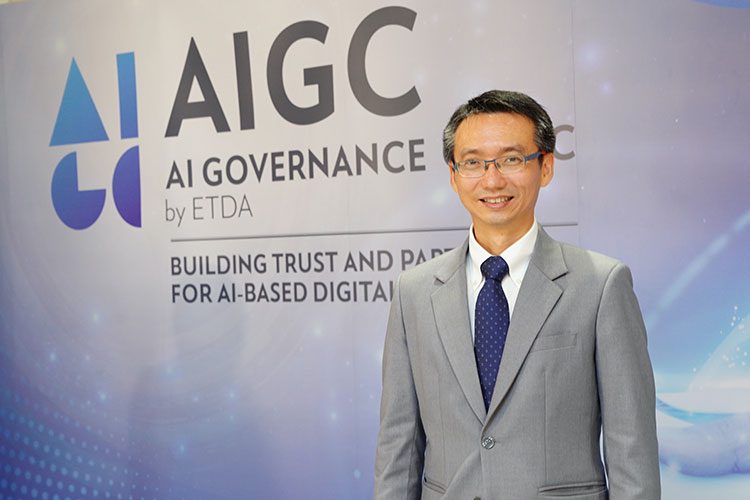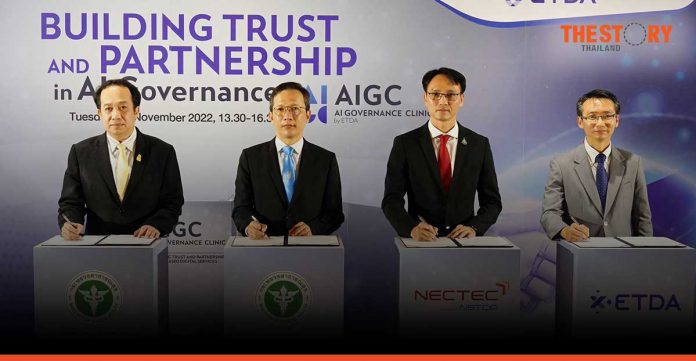The Electronic Transactions Development Agency (ETDA) has joined its Thai and foreign partners in launching the AI Governance Clinic by ETDA (AIGC) to upgrade the standards of Thailand’s governance on artificial intelligence (AI).
Initially, ETDA is partnering with the National Electronics and Computer Technology Center (NECTEC), the Ministry of Public Health Department of Medical Services, and the Department of Health Service Support to expedite the creation of a framework for AI governance in the healthcare sector as well as making recommendations and spreading knowledge regarding the matter.

ETDA Executive Director Dr Chaichana Mitrpant says that as AI has become a dominant technology today, countries around the world are developing policies, standards and guidelines on AI governance so that the application of AI is not only creative and efficient but also in line with governance principles.
Thailand is ranked 59th among 160 countries on the Government Artificial Intelligence Readiness Index of 2021, a collaboration between Oxford Insights of the United Kingdom and the International Development Research Centre of Canada. Thailand’s AI governance score is 52.63, which is higher than the global average of 47.42. However, the country’s score in Governance and Ethics is lower than the global average. Such result calls for the prevention of risks and potential adverse effects from Thailand’s application of AI for virtually all industries.
The issue of AI governance has been regarded as one of the important strategies included in the National Implementation Plan on Artificial Intelligence. This plan is aimed at involving all the relevant parties to drive the application of AI technology with good governance and responsibility and in line with international standards.
Improvement of digital services and AI governance can help reduce potential risks which in turn can boost confidence in electronic transactions. Safe, stable and reliable transactions are necessary to increase the confidence of foreign investors in the long term.
This is another challenging task for ETDA, which has worked relentlessly to promote and oversee the use of AI technology. Its work involves studying overseas cases and gathering information about relevant laws, standards and guidelines to create a framework for the technology’s application in line with AI governance. The goal is to build an AI standard landscape in Thailand, paving the way for recommendations and standards involving the application of AI with governance, the study of the assessment of AI-based computer programs, knowledge transfers and skill development to prepare Thais for the efficient application of AI.
The Academy of Digital Transformation by ETDA, or ADTE, is responsible for the implementation to achieve these goals. Also, exchanges of knowledge are carried out through AI webinars on AI governance attended by experts from inside the country and overseas. Electronic books (e-books) “AI the Series” have been released every month recently to bring AI closer to people and make it easy to understand.
Those developments led to the launch of AIGC during the “Building Trust and Partnership in AI Governance” event today. The AIGC will serve as a source of knowledge and expertise on AI governance from leading countries around the world. It is aimed at pushing for the application of AI with governance to cover important sectors, starting with healthcare.
Dr Chaichana said that the AIGC is regarded as a crucial step for ETDA, as well as partnerships with important agencies in the country and overseas. Its mission is to promote responsible AI use and create a framework and guide for the proper and transparent application. The goal is to minimize the risks or impacts on users.
“As a result, Thailand will see increased competitiveness and a larger added value of the digital economy,” the ETDA chief concluded.
Meanwhile, ETDA senior adviser Dr Sak Segkhoonthod says the AIGC mission covers four areas. The first dimension involves developing a framework for AI governance for electronic transactions in a way that is in line with Thailand’s context and international standards. The second concerns providing advice on AI policies and governance regarding electronic transactions to all the parties involved. The third area involves producing and distributing information, knowledge and research findings relating to the application of AI with good governance. And the final aspect covers building a network of experts — domestically and internationally — for the exchange of academic data and knowledge on innovation and technology regarding AI governance.
In the initial stage, the AIGC will focus on the medical and healthcare sector where AI technology has been increasingly used in the diagnosis, screening and treatment of patients.
Today (November 8), ETDA and its partners NECTEC, the Department of Medical Services, and the Department of Health Service Support have signed a memorandum of understanding (MOU) for cooperation in developing a national AI governance framework and AI governance policy guidelines for the medical sector and for the exchange of knowledge concerning AI innovations and technologies.
The AIGC services include offering advice and training to improve skills in AI technology for electronic transactions. The AIGC serves public and private agencies as well as interested business operators. It also conducts surveys on Thailand’s AI governance preparedness for future reference in planning legislation, standards and guidelines to regulate Thailand’s AI matters in the future.
The AIGC’s strength is its network of working groups consisting of experts from various agencies, including academic and research institutions from many countries, according to ETDA senior adviser Dr. Sak. He said they have expertise in international AI standards and innovations with experience in the AIGC’s focus areas, such as healthcare, finance, business and education.
“They come together as consultants in the International Policy Advisory Panel (IPAP), allowing the AIGC’s operation to cover important aspects like technology and governance while also taking into account the protection of user rights,” Dr Sak concluded.





